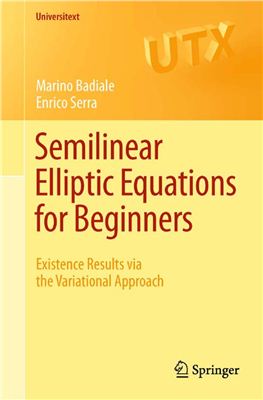Springer, 2010. - 199 pages.
Semilinear elliptic equations are of fundamental importance for the study of geometry, physics, mechanics, engineering and life sciences. The variational approach to these equations has experienced spectacular success in recent years, reaching a high level of complexity and refinement, with a multitude of applications. Additionally, some of the simplest variational methods are evolving as classical tools in the field of nonlinear differential equations.
This book is an introduction to variational methods and their applications to semilinear elliptic problems. Providing a comprehensive overview on the subject, this book will support both student and teacher engaged in a first course in nonlinear elliptic equations. The material is introduced gradually, and in some cases redundancy is added to stress the fundamental steps in theory-building. Topics include differential calculus for functionals, linear theory, and existence theorems by minimization techniques and min-max procedures.
Requiring a basic knowledge of Analysis, Functional Analysis and the most common function spaces, such as Lebesgue and Sobolev spaces, this book will be of primary use to graduate students based in the field of nonlinear partial differential equations. It will also serve as valuable reading for final year undergraduates seeking to lea about basic working tools from variational methods and the management of certain types of nonlinear problems.
Semilinear elliptic equations are of fundamental importance for the study of geometry, physics, mechanics, engineering and life sciences. The variational approach to these equations has experienced spectacular success in recent years, reaching a high level of complexity and refinement, with a multitude of applications. Additionally, some of the simplest variational methods are evolving as classical tools in the field of nonlinear differential equations.
This book is an introduction to variational methods and their applications to semilinear elliptic problems. Providing a comprehensive overview on the subject, this book will support both student and teacher engaged in a first course in nonlinear elliptic equations. The material is introduced gradually, and in some cases redundancy is added to stress the fundamental steps in theory-building. Topics include differential calculus for functionals, linear theory, and existence theorems by minimization techniques and min-max procedures.
Requiring a basic knowledge of Analysis, Functional Analysis and the most common function spaces, such as Lebesgue and Sobolev spaces, this book will be of primary use to graduate students based in the field of nonlinear partial differential equations. It will also serve as valuable reading for final year undergraduates seeking to lea about basic working tools from variational methods and the management of certain types of nonlinear problems.

